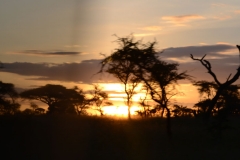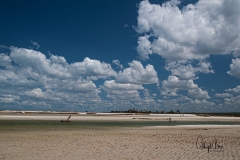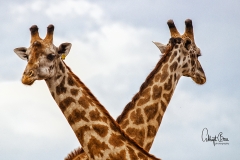FAQ
The traditional gratuity to safari guides, camp staff, mountain porters etc. is not included in the price of your tour but is completely discretionary. You should tip in accordance with the level of service you have received.
The following guidelines are generally accepted practice (per safari group, per member of staff): Safari guide(s) – USD 10-15 per day; Cook (on camping safaris) USD 7; tented camp, lodge or hotel staff – USD 3-5 per day, as a pooled tip to be shared among the housekeepers, waiters, bartenders, etc.
For porters and waiters at hotels and for taxi drivers in cities, the customary tip is approximately USD 1, and tipping in one dollar bills for porters and waiters is greatly appreciated.
On domestic flights in Tanzania, the planes are often small and light, especially if travelling from or to national parks, or on the very short flights between Dar es Salaam and Zanzibar. The per person luggage allowance for checked baggage is 15kg per person (except on Precision Air when it is 20kg per person). In addition you are allowed one piece of hand luggage as usual. In reality, bags are usually not weighed – especially when flying from airstrips out in the bush. However, if you are very clearly over the luggage allowance, the carrier of course reserves the right to charge per excess kilo. The cost varies from carrier to carrier, but is usually somewhere around USD 3-5 per extra kilo. Whether the extra weight is actually charged or not depends on load that day, where you fly from, and the carrier you fly with. As far as we are concerned, we advise you to pack sensibly in rucksacks or soft-sided suitcases. This makes packing your luggage into the safari vehicle much easier.
Clothes for safari should be light, comfortable and not too brightly coloured. There is little or no requirement for anything formal. A light jacket or sweater may be needed in the evenings at higher altitudes such as the rim on the Ngorongoro Crater. Comfortable walking shoes are an essential, as is a hat to keep off the sun. Sunglasses and a spare pair of prescription glasses are also suggested. Don’t forget a swimming costume for use at the lodge pools.
Most people bring binoculars and/or cameras and video equipment with plenty of tape or film. Zoom or telephoto lenses are likely to be useful. Film is also available at most lodges/camps but can be expensive. Almost all lodges/camps including our private and shared luxury tented camps have power points to facilitate charging of digital cameras and laptops.
Most of the better hotels and lodges will spray rooms and provide mosquito nets, but do bring your own insect repellent sprays.
A flashlight is always useful.
There will be no television or radio in most places, so you might want to bring an iPod, little short-wave radio or Walkman if you want to keep up with world events or listen to some music.
Remember that safari vehicles and light aircraft have tight limits on the size and weight of luggage carried.
For ease in loading luggage in both the safari vehicle and any light aircraft, soft sided bags are strongly suggested.
Check with your doctor to get the current recommendations and advice.
Anti malarial tablets are strongly recommended.
Although the Kilimanjaro climb is often described as available to any reasonably fit person, the combination of strenuous exercise, cold and high altitude can have adverse effects. If in doubt please consult your doctor in advance.
Tanzania requires that arriving persons carry proof of a valid yellow fever vaccination when they are arriving from an endemic area. This includes those who have first visited Kenya which is considered endemic. The vaccination must be administered 14 days before arrival.
There is a departure tax on International flights of $30.00. This will generally have been included and already paid in the price of your international ticket.
If your final departure is from Zanzibar, you will have to pay in U. S. Dollars cash on departure.
The current cost of a visa for US and Irish citizens is US $100 per person. Most other nationalities pay US $50 per person. These are available at the point of entry but must be paid for in U.S. dollars cash.
Visas are also available from Tanzanian Embassies and Consulates in many countries.
If you are entering Tanzania through Nairobi you are also required to have a visa for Kenya which may be purchased on arrival or in advance from embassies. There is a concessional “Transit Visa” rate for passengers simply transiting through Kenya.
Safari Price includes:
– 4×4 safari land Cruiser with open roof
– All game Park Entrance fees
– Fullboard accommodation in lodges as per the itinerary.
– Use of our Professional Driver Guide.
– All Government taxes and levies
– Drivers Allowances
Not included
– Tips to the driver/guides
– International airfare & flights
– Airport departure tax
– Travel insurance Visa and Passport fees
– Alcoholic and non-alcoholic drinks and beverages
A safari is a wonderful trip for any child old enough to enjoy and appreciate the experience. On most safaris there are quite long trips on rough roads, and these cannot really be recommended for babies and very young children.
Children under 12 will benefit from reduced fares on scheduled airlines, and many lodges will provide an additional bed for a child sharing a room with parents at a reduced cost. Some luxury small capacity tented camps do not allow children younger than 12 years old.
If you are arranging an exclusive vehicle (custom) safari, then you are free to arrange whatever itinerary you choose, within logistical constraints. Safari Solutions presents a small selection of proven itinerary favourites in this website. We can arrange any required itinerary subject to practical and logistical considerations and will be pleased to discuss and quote for your special requirements.
Yes. All safaris can be booked with the exclusive use of a vehicle for your party. A custom safari for two clients is significantly more expensive per person than seats on a similar small group safari. However, on a custom safari with an exclusive vehicle, the cost of the vehicle and driver/ guide are divided by the number of clients sharing the vehicle. Therefore, the per person cost of a custom safari reduces the more clients that are sharing the vehicle (maximum in one vehicle is 7).
Again, we cannot make any guarantees but you will have a good chance of seeing the Big 5 at any time of year in Tanzania (of course depending on the national parks you visit).
Elephant and buffalo can be found in Lake Manyara, Tarangire, Ngorongoro, Serengeti and Arusha National Parks.
Lion are found in Lake Manyara (very difficult to find), Tarangire, Ngorongoro and Serengeti.
Leopard are found in Tarangire, Ngorongoro and Serengeti.
Black Rhino are found in Serengeti (very, very, very difficult to find here) and Ngorongoro (probably this is your best bet for spotting a black rhino).
Of course wild animals move at their own will, and the wildebeest of the Great Migration move in accordance with the rains, which of course cannot be predicted (or only guessed to a certain extent).
You should be aware that the migration, whilst a wonder of the world and a spectacular sight for anyone lucky enough to witness it, is a much more static affair than many people realize. It is not possible to “follow” the herds, driving along with them, or even booking lodges, tented camps or campsites wherever they happen to be at any given moment. Of course all accommodation must be booked in advance and so this is not possible.
The famous river crossing is notoriously difficult to predict. It takes 1-2 weeks for the wildebeest to cross, and this can take place any time within a period of about 6-8 weeks. If it is very important to you to try, to maximize your chances of seeing this, we always advise to book for July, and stay as far north as possible in the Serengeti (where, at this time, only top-end luxury tented camps are located).
The most important thing to remember is that game viewing in Tanzania is truly excellent all year round. Even if you are not there for the migration there are resident herds all year round. Wildlife drama can, and does, take place all year round in Tanzania.
There is no cut off. However, flights into Kenya and Tanzania are limited and we find that there can be problems getting seats on British Airways or KLM if you try to schedule less than two months ahead of time. Peak seasons also book up as far as nine months ahead of time. Mid/late December and early January is a busy time in both Kenya and Tanzania. Outside of peak seasons, you should have no trouble booking if you schedule your safari at least six to eight months in advance.
However, if you are looking to book a last-minute safari, please don’t hesitate to get in touch with us, and we will always be happy to see what we can do for you!
The climate of Tanzania is tropical, so warm and generally comfortable weather throughout the year is standard, with the coast experiencing higher levels of humidity than other areas.
Tanzania experiences two rainy seasons, the heavier one being between mid-March to May and the other in November, December and sometimes January. As stated above, though, don’t let this put you off travelling at these times of year!
Of course, the mountainous and highland areas of the country are cooler, with temperatures sometimes dropping below 15°C at night during June and July. In this area, it can rain at any time of year (usually in the early mornings if at all).
The island of Zanzibar also receives hot weather all year round, with temperatures ranging from 22-34°C or more. Zanzibar also experiences a rainy season between April-May, when downpours can be quite long and heavy. However, even during the rainy season, there are many burst of sunshine and sunny afternoons, and even whole days.
Just about any time of year. However, the most popular seasons are mid December to mid March and July to mid September. This is because of the demand for Christmas and winter holidays and the summer school breaks. An increasing number of visitors are realizing that June and October are ideal, benefiting from lower visitor numbers.
Safari Solutions offers some safaris with greatly reduced or no single supplements in the months of April and May. Also, we may well be able to offer some good discounts for larger groups during this period – please contact us for details.













